The Zone of Interest was the area surrounding Auschwitz concentration camp created in 1941 to house SS officers. Right on the other side of the fence, Rudolf Höss and his family lived a privileged life inside a two-storey home with servants, a garden, a pool, access to a stream for fishing and the respect and admiration of the entire SS army. Höss was instrumental in the Holocaust, being the first to implement Zyklon B, the chemical used in the gas chambers. In 2023, Jonathan Glazer gave us a look into the Zone, and in doing so, created one of the most important and horrifying films about the Holocaust ever seen.
The horror of this film lies in its subtleties, the Nazi’s comfort and belief that all of this is normal. This film doesn’t have to be an acting powerhouse like ‘Schindler’s List’ or ‘The Pianist’, it just has to show you the behaviour of the SS officers and their families behind closed doors. Glazer perfectly demonstrates that the background of an artwork is just as, if not more important than what’s front and centre. The film is mostly silent, casting you into a contemplative atmosphere. No words need to be said, you just need to watch, listen and think.
In 1943, Rudolf Höss tries to balance his work life and family life as best he can, but when he’s given a promotion, it threatens to upset his family dynamic. He’ll be in Oranienberg with no way to father his children or care for his wife. While he oversees most operations, his wife back in the Zone struggles to keep up their living standards. There’s no overwhelming conflict, no foe to defeat or item to obtain, it’s more terrifying than that: It’s a week in the life of Nazis.
While I applaud the performances of Christian Friedel (Rudolf Höss) and Sandra Hüller (Hedwig Höss, his wife), I struggle to pick out anything noteworthy, that’s the point. The idea that any of these events could be approached with a straight face, that anyone can experience this without recoiling in disgust and fear is disturbing, and in that manner, Friedel and Hüller are perfect.
One of the most astonishing aspects of the film is the camera work. In every scene, you see almost the entire room, you feel like you’re a scared, young child, stuck in the naughty corner. With people such as these, it feels even more anxious, as if you’re trapped with them, doomed to spend your life in a house of extreme hatred and relishment of the treasures awarded to fascist mass murderers.
As previously stated, the real horror lies in the background of the film. I was both shocked and amazed when in one scene, I could see a silhouette from the window of one of the Auschwitz buildings. The level of detail is unbelievable. Even when it’s almost unrelated, your mind connects the dots and you’re uncomfortable in your own skin once again. In one of the final scenes, a group of women clean a Holocaust museum, and it only took a dustpan and broom to fling me into the darkness again.
Mason’s Top 3 Reasons To Watch ‘The Zone Of Interest’
- A level of background information unmatched by any film, the sounds and sights of death everywhere, even on multiple watches, I’m sure you’ll find new details
- Cinematography so uncomfortable, creating fear out of Nazis living their domestic lives.
- A Holocaust film from the Nazi’s perspective, a harrowing look at how they were rewarded and their attitudes to the war.

Mason Horsley is a graduate of UOW with a Bachelor’s degree in Creative Arts, majoring in Creative Writing and minoring in Theatre. He hopes to write and direct a feature film and has been working on screenplays since he was 17. He writes film reviews for the Tertangala and works on his latest project ‘The Last Film’ while working a full-time job at a fish market. Mason despises reviewing films he dislikes and because of this, every review he writes acts as a recommendation.
Image Credit: IMDb




